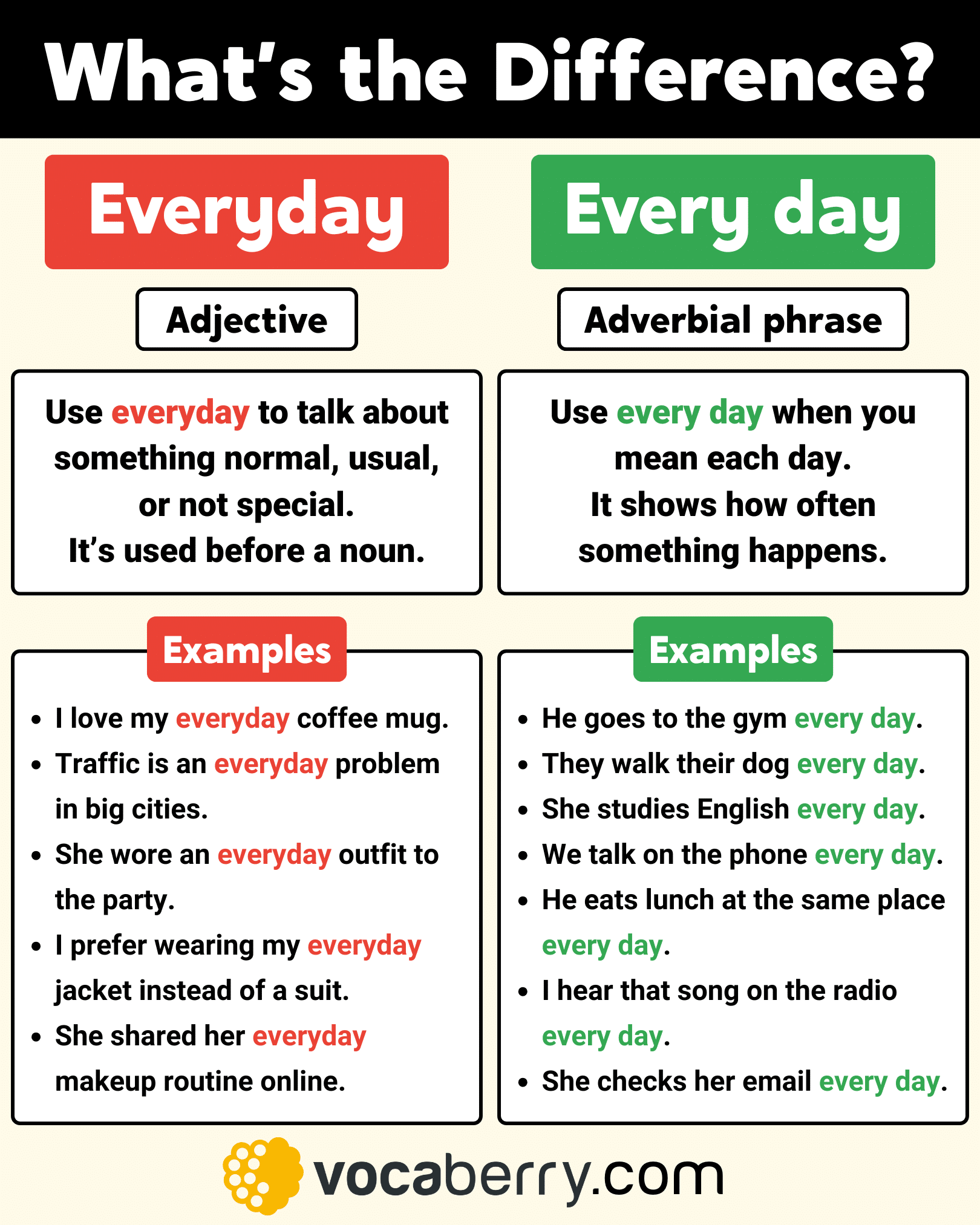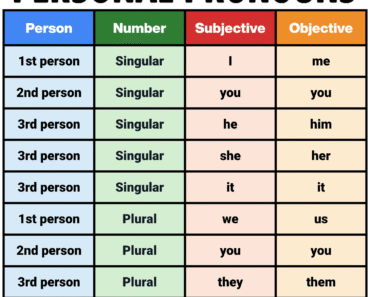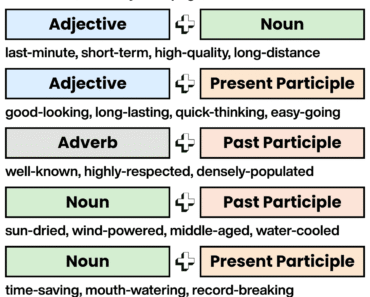
Many English learners—and even native speakers—often confuse “everyday” with “every day.” These two terms are spelled almost the same, sound identical when spoken, and are only separated by a single space. Yet, that space changes the entire meaning and grammatical function of the phrase. Knowing when to use “everyday” versus “every day” can greatly improve your writing accuracy, especially in formal contexts such as essays, emails, academic work, and professional documents.
Understanding the distinction is not just about memorizing rules, but about recognizing how language functions. This guide will walk you through the definitions, grammar roles, examples, common mistakes, and a quiz at the end to test your knowledge.
Everyday
The word “everyday” is a single word that functions as an adjective in English. Adjectives describe or modify nouns—they tell us what kind, how many, or which one. When you use “everyday” in a sentence, you are describing something that is routine, typical, or ordinary. It refers to something that is part of daily life or not unusual.
You’ll often find “everyday” appearing before a noun, just like other adjectives. It adds meaning to that noun by expressing its usual, day-to-day nature.
Examples:
-
These are my everyday clothes.
-
Traffic is an everyday occurrence in the city.
-
She enjoys reading about everyday life in different cultures.
-
Coffee is an everyday necessity for many people.
In each of these examples, “everyday” is describing a noun—clothes, occurrence, life, and necessity. The term suggests that the object or concept is typical or part of a regular routine.
You should not separate “every” and “day” in these contexts, because doing so would break the function of the word as an adjective. Writing “every day clothes” instead of “everyday clothes” is grammatically incorrect and changes the meaning entirely.
Every day
On the other hand, “every day” is not a single word, but a two-word phrase consisting of “every” (a determiner) and “day” (a noun). Together, they function as an adverbial phrase that answers the question: When? or How often?. “Every day” means each day or on all days—it refers to something happening as part of a repeated routine.
This phrase is not used to describe a noun, but to tell us how frequently an action is done. You’ll usually find it after the verb in a sentence.
Examples:
-
I go for a walk every day.
-
She studies English every day after dinner.
-
He eats oatmeal every day before work.
-
We talk on the phone every day.
In each of these sentences, the phrase “every day” is telling us when or how often something happens.
A simple trick to check whether “every day” is the correct form is to try replacing it with the phrase “each day.” If the sentence still makes sense, then “every day” is the correct form to use.
For example:
-
I go for a walk every day.
-
I go for a walk each day. (Correct, same meaning)
However:
-
I wear my each day clothes. (Wrong)
-
I wear my everyday clothes. (Correct)
Comparison Chart – What’s the Difference?
To make things clearer, here’s a table comparing the two terms across different categories:
| Feature | Everyday | Every day |
|---|---|---|
| Spelling | One word | Two words |
| Part of speech | Adjective (describes a noun) | Adverbial phrase (modifies a verb) |
| Meaning | Ordinary, typical, common | Each day, happening daily |
| Sentence function | Answers “What kind?” | Answers “When?” or “How often?” |
| Position in sentence | Before a noun | After a verb or clause |
| Can be replaced with “each day”? | No | Yes |
| Example | These are my everyday shoes. | I wear these shoes every day. |
Common Mistakes
Because of their similar appearance and sound, these words are frequently confused. But confusing them can result in unclear or awkward writing. Here are some frequent mistakes:
-
Incorrect: I take a shower everyday.
Correct: I take a shower every day.
(You’re talking about how often—daily.) -
Incorrect: These are my every day clothes.
Correct: These are my everyday clothes.
(You’re describing the type of clothes.) -
Incorrect: She brings her laptop everyday to work.
Correct: She brings her laptop every day to work.
(You’re describing frequency.) -
Incorrect: We should plan for every day issues.
Correct: We should plan for everyday issues.
(You’re describing the type of issues—common, routine.)
To avoid these errors, pause and ask yourself what you’re trying to say. Are you describing something typical? Use “everyday.” Are you stating something happens daily? Use “every day.”
Everyday vs. Every day Quiz
Choose the correct option for each sentence:
1. I drink green tea ___ to boost my metabolism.
a) every day
b) everyday
2. This is my ___ bag for work.
a) every day
b) everyday
3. We meet ___ at the café.
a) every day
b) everyday
4. She wanted something for ___ use.
a) every day
b) everyday
5. I check my emails ___ morning.
a) every day
b) everyday
6. His ___ routine includes meditation.
a) every day
b) everyday
7. He listens to the same podcast ___.
a) every day
b) everyday
8. You should not wear your ___ shoes to a wedding.
a) every day
b) everyday
9. They call their parents ___ after dinner.
a) every day
b) everyday
10. I love my ___ coffee mug.
a) every day
b) everyday
Quiz Answers
1) every day
2) everyday
3) every day
4) everyday
5) every day
6) everyday
7) every day
8) everyday
9) every day
10) everyday






